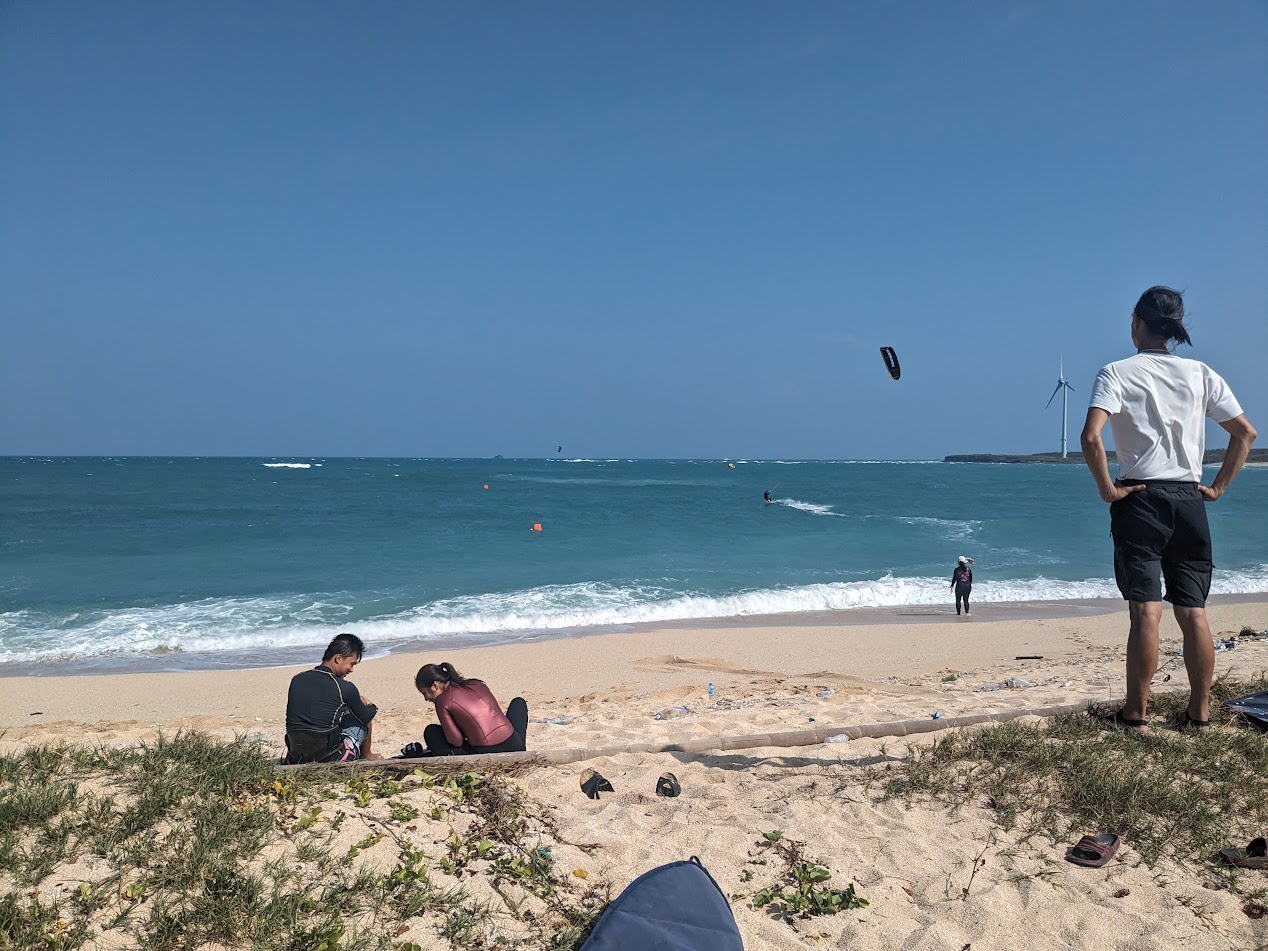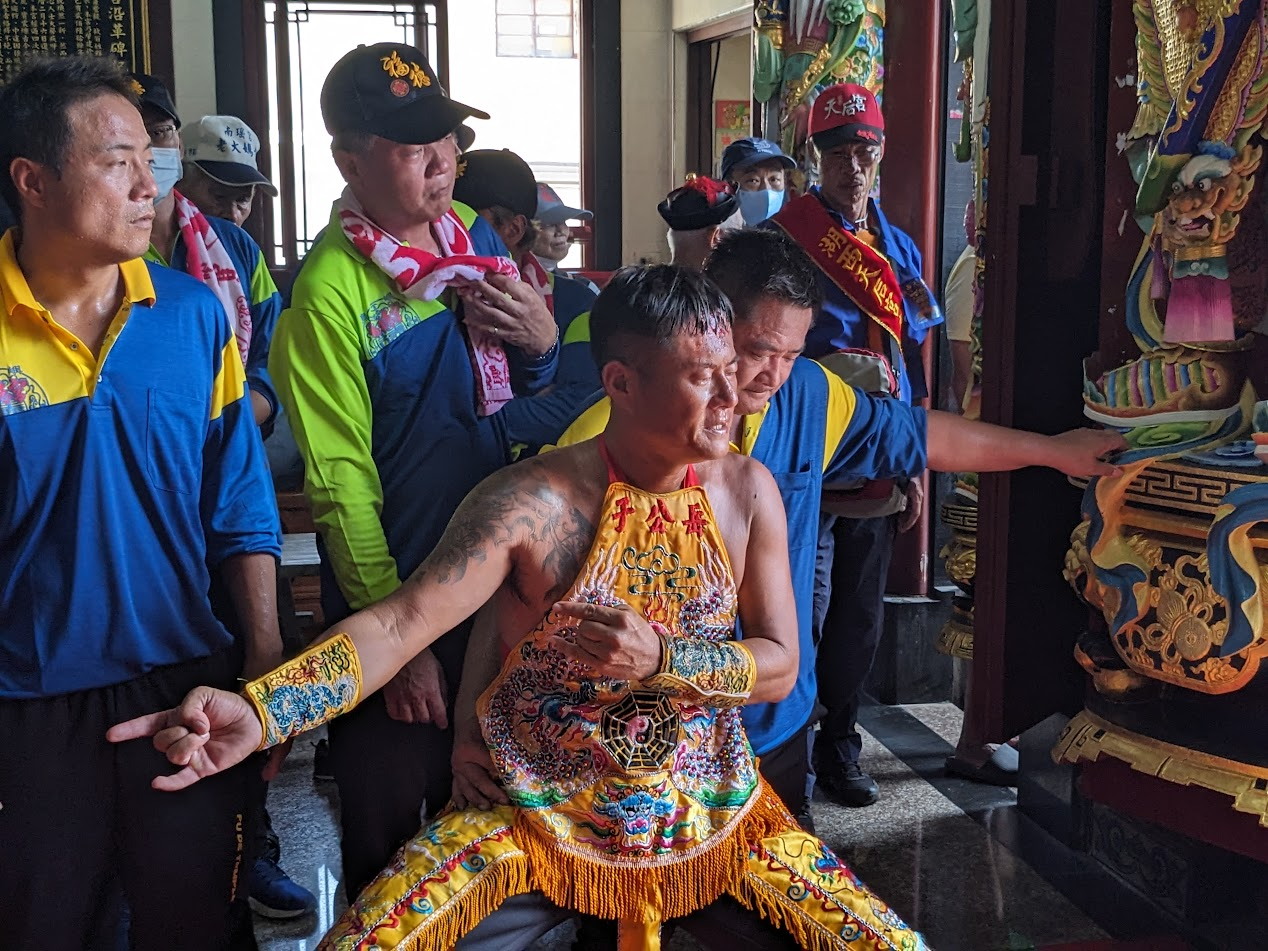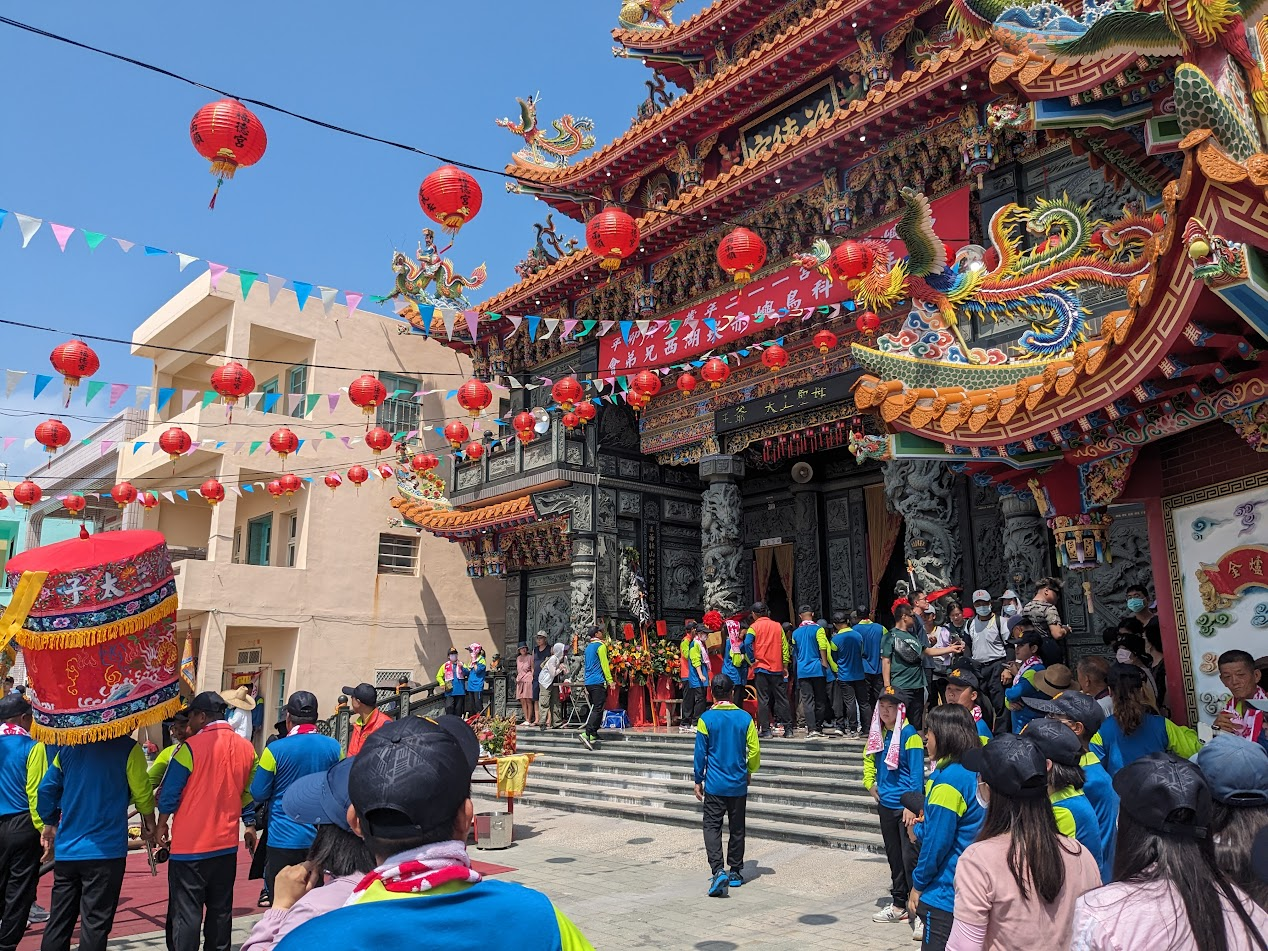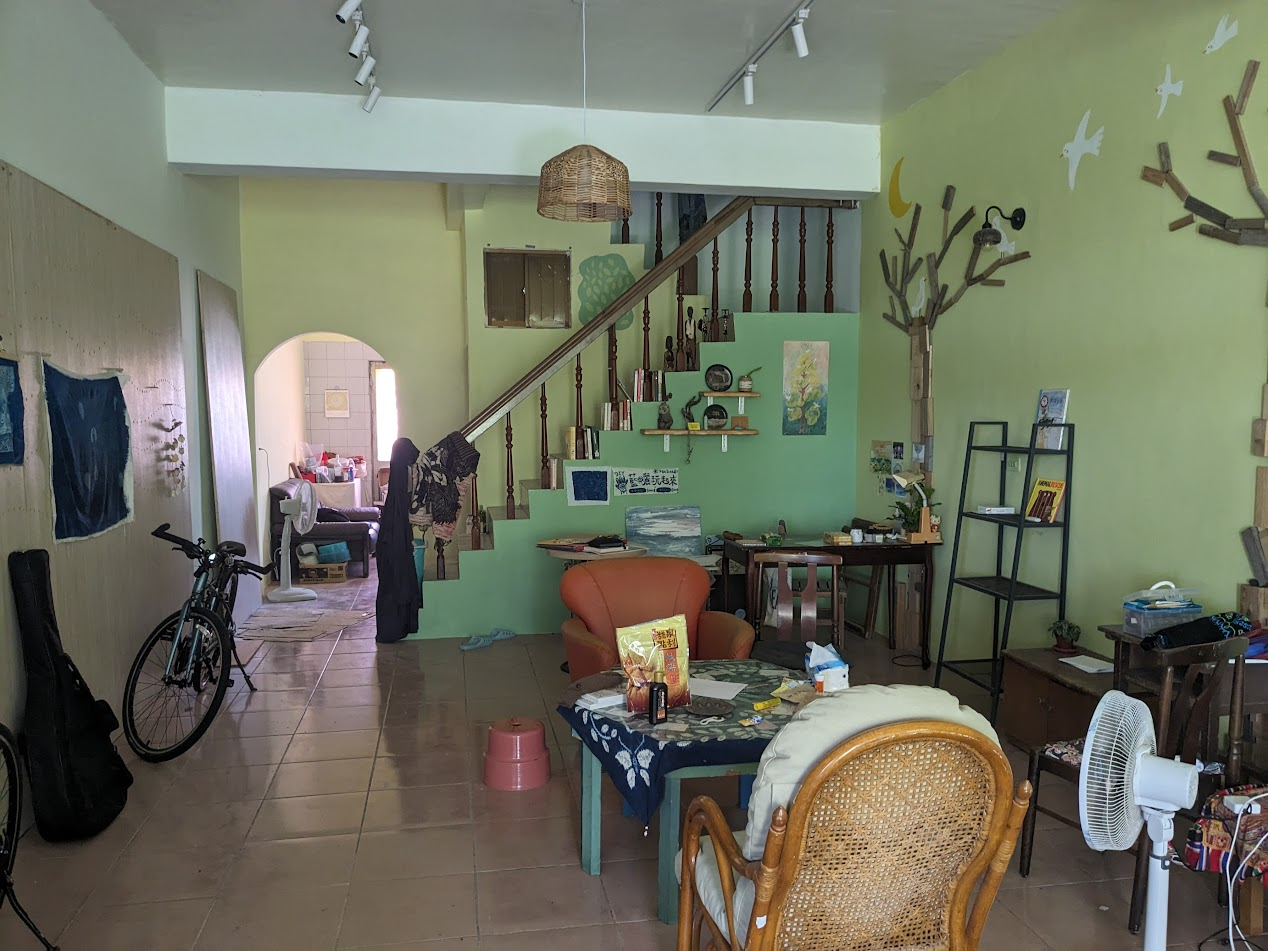澎湖 The Penghu Islands
I went to Penghu this weekend. It’s my new favorite place in
Taiwan, so here are some memories from the places I went to.

As a preface, I had a fair amount of anticipation for this trip. Even the map of Penghu reminds me of a Pokemon game. The island is mostly naturer, and scaled so that you can bike from Magong City to Shiyu Township in just 3-4 hours. So reasonable, but not so small.
In every part of Penghu, you’re not so far from the water. Boats and bridges are essential forms of transport in the Penghu islands. Bridges connect the main island that Magong is on to Baisha Township, and the relatively new Penghu Great Bridge (1970) connects Baisha to Shiyu. For the other adorably small islands, you have to take a boat.
It all makes Penghu so much more lang4man4 (romantic) than I even thought it would.
馬公 Magong. Though Magong is a city, the buildings are low and the people are kind. There’s a Poya, 50 Lan, tons of 7-Elevens like everywhere else in Taiwan. There’s also numerous lovely vegetarian places. I had a solid meal at a Loving Hut. There’s a vegan breakfast place near the ferry port that sells sandwiches and fantuan (rice balls). Two times I went to a buffet-style restaurant, which is also all-vegan and open every day!
My
friends, Don, Lily and Truman and I all went to a wonderful vegan
late-night tea shop. They’re open till midnight and rest on
Wednesdays. They have awesome noodles, a friendly  laoban,
and great books upstairs
about all sorts of spiritual subjects.
laoban,
and great books upstairs
about all sorts of spiritual subjects.
 I went to a museum about early life in Penghu. I went by myself and I’m glad I did, because I go through museums at a blitz-pace (1 hour for 2 floors). I learned that Penghu has archeological remains that date even before Taiwan. But most people didn’t settle in Penghu because they realized it’s damn hard to grow anything there when it’s so windy in the winter. Most people made voyages to greener pastures in Kaohsiung or Pingtung. Fruits and vegetables are still mostly shipped to Penghu from Kaohsiung.
I went to a museum about early life in Penghu. I went by myself and I’m glad I did, because I go through museums at a blitz-pace (1 hour for 2 floors). I learned that Penghu has archeological remains that date even before Taiwan. But most people didn’t settle in Penghu because they realized it’s damn hard to grow anything there when it’s so windy in the winter. Most people made voyages to greener pastures in Kaohsiung or Pingtung. Fruits and vegetables are still mostly shipped to Penghu from Kaohsiung.

Another night, Don, Lily and I biked around. We saw a very tall statue of Mazu or the Buddha or Dao-incarnation or something. And we also saw the end of a rocking concert.
People in Penghu are willing to chat and chat. My friend Truman was especially good at this. There’s no rush on Taiwan’s outlying islands. Magong provides a hub for the collection that is Penghu, but at a relaxed pace.
湖西 Husi.
Also on the same island as
Magong. I went to this place
on my last full day. I had a guy staying in my hostel called Mumin.
He was really into kite surfing. Most people come to Penghu during
the summer to avoid the fierce winds that come in the winter. But for
a kite surfer, Penghu in the winter is the perfect place to hone your
craft. It’s apparently the
best in Taiwan, and even draws international attention.
Mumin invited me and Truman to go out to Husi with him and witness some real kite-surfing in action. Truman was hoping to join, but it turns out that kitesurfing isn’t something you learn in an afternoon. It took Mumin 3-4 years of kitesurfing on the weekends when he lived in Japan to get to the point where he actually could. That’s because in most places, kitesurfing is possible only occasionally – the winds have to be strong and pointed inland (so you’re not dangerously drawn out into the sea). Kitesurfing is also rather expensive to get started. It costs about 6000-7000USD to buy a decent kite and board. And lessons can be almost 100USD an hour (at least with the people Mumin knew). Truman was a little scared off. I admired the kitesurfing from afar but had little desire to participate.

 On
his break from the waves, Mumin told me about his life. He’s Taiwanese and grew up in Taipei, but lived in
America for 10 years doing college and his masters. Then
he worked as a tour guide, then tour-bus driver in LA for a while. As
a bus driver he met his to-be-wife,
who is Japanese, and they
stayed in touch across the Pacific ocean. He
eventually moved back to Taiwan. It was then that he found a job
working for the US government gathering intelligence through
open-source research in Mandarin/Chinese. The
job was a little dry. As someone not of American nationality, he’s
not able to get security clearance for anything cool. But his
information gathering contributed to the intelligence of the CIA. He
worked alongside Americans who were highly proficient in Chinese and
Japanese, some from the Mormon church. He
was able to be placed in Japan, but being on the US military base, he
didn’t have to know Japanese. He says that job was custom made for
him. Now, he works
part-time as a contracter. He spends the winter season in Penghu and
the other half of the year in Japan with his wife.
On
his break from the waves, Mumin told me about his life. He’s Taiwanese and grew up in Taipei, but lived in
America for 10 years doing college and his masters. Then
he worked as a tour guide, then tour-bus driver in LA for a while. As
a bus driver he met his to-be-wife,
who is Japanese, and they
stayed in touch across the Pacific ocean. He
eventually moved back to Taiwan. It was then that he found a job
working for the US government gathering intelligence through
open-source research in Mandarin/Chinese. The
job was a little dry. As someone not of American nationality, he’s
not able to get security clearance for anything cool. But his
information gathering contributed to the intelligence of the CIA. He
worked alongside Americans who were highly proficient in Chinese and
Japanese, some from the Mormon church. He
was able to be placed in Japan, but being on the US military base, he
didn’t have to know Japanese. He says that job was custom made for
him. Now, he works
part-time as a contracter. He spends the winter season in Penghu and
the other half of the year in Japan with his wife.
白沙和鳥嶼 Baisha and Niaoyu. Truman have gotten this word of this festival on an island called Niaoyu. You have to take a boat from a spot in Baisha and take a 20-minute boat ride to get there. But the amount of 熱鬧 (re4nao4, liveliness) apparently was unparalleled. Truman had been to a similar festival before and was excited to go.
So my first day in Penghu, biked over to meet Truman at the dock and catch the next boat over. We had gotten the timings wrong so waited an hour for the next ride. When it did actually come, it turned out to be reserved for Penghu residents. Apparently, so many people were going to Niaoyu to watch the re4nao4 – the event was called “brother ceremony” that they couldn’t let outsiders in just yet. We decided to try again the next day.
The next day we were successful in getting on the boat. It was in fact due to the kindness, or sympathy, of the lady manning the dock. She saw we had come two days in a row, eager as ever to get to this event, and so saved us have two seats. We got to Niaoyu island after much anticipation.
The Brother Ceremony was one of the most bizarre religious events I’ve ever seen. There were bright, dyed fireworks outside the temple and loud cracking noises from the detonations. The speakers from the temple could be heard literally throughout the island. The temple was crowded with devotees from Niaoyu itself but also other nearby islands. Maybe that has something to do with the “brother” part of the Brother Ceremony.
 Truman
and I pushed our way through the crowd. It wasn’t hard because
people were sapped from the force of the Penghu sun. Inside
the temple were three men dressed in red and gold gowns. Two
were old and pudgy. One was
young, relatively – maybe 40-50 years old.
Truman
and I pushed our way through the crowd. It wasn’t hard because
people were sapped from the force of the Penghu sun. Inside
the temple were three men dressed in red and gold gowns. Two
were old and pudgy. One was
young, relatively – maybe 40-50 years old.  They
all had blood flowing from their foreheads. They
all were salivating. And they all looked like they were about to pass
out. I was somewhat prepared for this but god, it was still
flabbergasting to see people that really believed they were possessed
by god. In fact it looked like they had rabbies. Drums
beat loudly. The younger man sometimes danced. But he mainly knelt in
a supporters arms, eyes
half-closed and shaking his body. The
ceremony concluded.
They
all had blood flowing from their foreheads. They
all were salivating. And they all looked like they were about to pass
out. I was somewhat prepared for this but god, it was still
flabbergasting to see people that really believed they were possessed
by god. In fact it looked like they had rabbies. Drums
beat loudly. The younger man sometimes danced. But he mainly knelt in
a supporters arms, eyes
half-closed and shaking his body. The
ceremony concluded.
There was another part where other old dudes dressed in more costumes – this time, like the gowns of men in the Qing Dynasty, and did other stuff. Let me tell you it’s weird to see this shit in the 21st century. And let’s not forget that the Daoist Temple, like any other nonprofit, has many hired camera-folk so that the donors don’t forget that it happened.
Truman and I then walked around and looked for vegan food on the island. We had packed food with us, but Truman said he wanted to walk around partially to take a chance to chat with people and small talk. Most people’s responses were that there was absolutely nothing that was vegan on the island. Because of this religious event, which happens on such a scale only once every 15 years, all restaurants were closed. But we managed to grab some free fruit that some shop was giving out. Truman is the master of small talking to the point of getting free food. But he does it I believe out of curiousity. As we ate the fruit, a man asked me where I’m from, and I told him Egypt. Truman couldn’t keep a straight face.
Truman had met a man named Mr. Chen on another island at a similar religious ceremony. We saw Mr. Chen on the street chatting to some people he knew in Niaoyu. Since it was the Mid-Autumn Festival, many people were visiting Penghu from mainland Taiwan. Two brothers and their little cousin starting chatting to me. They’re conversation starter was, ni3hao3shuai4e!(you’re so handsome!) I smiled and partook in the conversation. One of the brothers was 23 like me. He had enrolled in the air force for college and trained as an army cook. He said it paid well, about 30-40kNTD a month, and that’s just for a beginner position. But it’s hard work. I asked him how much he thinks an air force pilot makes (which is what my manager’s husband does). He said 200k+NTD a month, which is a very large amount here. Anyways, we talked with these boys and their little cousin, a cute 8-year-old girl growing up in Taipei. She told us about the boys at school and how they’re really stupid. She said they tease her and then she hits them and then they chase her. It sounded like an ideal childhood.
西嶼 (Shiyu). I only went past Baisha to the other islands once.
 When
we gave up on taking the ferry to Niaoyu, Truman and I rode on his
scooter out to where he was staying in Xiyu. Xiyu
was beautiful. There are so many beaches there and natural sites.
Notably is Renkan, an old city that reminded
me of Roman ruins. It’s not that old. The houses are made of brick
and there are merchants selling random stuff there. We bought cactus
ice cream (or sorbet),
which turned out to be vegan, from a lady who used to host a show for
a broadcasting channel that spotlighted vegan restaurants all around
Taiwan. She was very pretty,
had that broadcasting host
face. After grabbing cactus
ice cream
we went to the very tip of Xiyu which had another ice
cream store. Truman knew the laoban
there, too, a nice chap who
told us how his fruit ice creams are made. Many flavors were also
vegan. Truman met him before and we talked so long that he also gave
us the ice cream for free. He insisted even though we had two scoops
between the two of us. This cactus ice cream was slightly
more sour and had some cool rose flavorings.
When
we gave up on taking the ferry to Niaoyu, Truman and I rode on his
scooter out to where he was staying in Xiyu. Xiyu
was beautiful. There are so many beaches there and natural sites.
Notably is Renkan, an old city that reminded
me of Roman ruins. It’s not that old. The houses are made of brick
and there are merchants selling random stuff there. We bought cactus
ice cream (or sorbet),
which turned out to be vegan, from a lady who used to host a show for
a broadcasting channel that spotlighted vegan restaurants all around
Taiwan. She was very pretty,
had that broadcasting host
face. After grabbing cactus
ice cream
we went to the very tip of Xiyu which had another ice
cream store. Truman knew the laoban
there, too, a nice chap who
told us how his fruit ice creams are made. Many flavors were also
vegan. Truman met him before and we talked so long that he also gave
us the ice cream for free. He insisted even though we had two scoops
between the two of us. This cactus ice cream was slightly
more sour and had some cool rose flavorings.

The last thing I did in Xiyu was snorkling. I didn’t quite get the hang of the breathing. Maybe the angle of my breathing tube wasn’t quite right, so it kept filling with water.So I favored just wearing the goggles and taking breaths like a normal swimmer (shout-out to mom and dad for forcing me to go to swimming class Wednesday evenings at Willesden Sports Center). The coral was colorful, magnificent, alien. It was big and sharp and I had to be careful not to graze it doing front-crawl. That day I took a bus back to Magong and was glad to have a night of rest back at my hostel.
澎湖倫 The Penghu Ferry. This boat is a thing of magnificence.
I should say a word about the Penghu Lun’s it’s predecessor, the Taihwa.
 The
Taihwa was also often docked at the Kaohsiung port and to Lily, and
another friend Penny, it sparked wonder and fascination. They dreamed
one day it could take them to the far away island that is Penghu. It
turns out that whatever company owned it found a buyer for the
Taihwa. They sold it and
somehow it got to be dissembled in Bangalore.
The
Taihwa was also often docked at the Kaohsiung port and to Lily, and
another friend Penny, it sparked wonder and fascination. They dreamed
one day it could take them to the far away island that is Penghu. It
turns out that whatever company owned it found a buyer for the
Taihwa. They sold it and
somehow it got to be dissembled in Bangalore.
The inside of the Penghu Ferry is like a palace. There’s flat-screen TV, beds you can rent on to sleep, reclining chairs, and a small store to buy food. In the bottom, there’s space for bikes, cars, vans, and food – whatever needs to be shipped from Kaohsiung to Penghu. It also has the distinctive smell of beetelnut and oil. When you’re on the boat, footing is unsteady in the subtlest of ways – you can’t quite tell which way the waves are going, but when you get on land things feel less sway-ey.

 On
the way back, I took an evening boat. I stood on top deck and other
Kaohsiungers who went to Penghu for the long weekend. My friends Don and
Lily watched the boat from Magong recede into the horizon. The sunset
illuminated the ocean, and I saw the disappearing outline of the Penghu
islands.
On
the way back, I took an evening boat. I stood on top deck and other
Kaohsiungers who went to Penghu for the long weekend. My friends Don and
Lily watched the boat from Magong recede into the horizon. The sunset
illuminated the ocean, and I saw the disappearing outline of the Penghu
islands.
This was originally posted on blogger.
Comments
More blogs...
Here are some other posts on related topics: